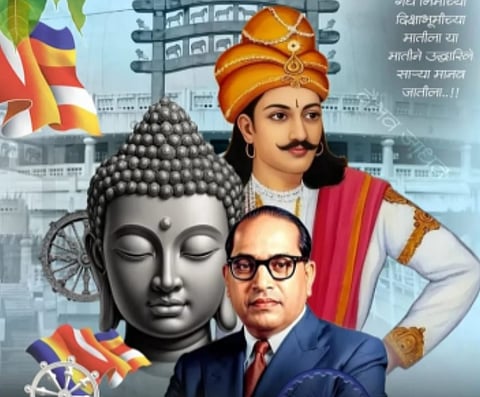
Nagpur- In a historic address to over half a million newly converted Buddhists at Deekshabhoomi, Dr. B.R. Ambedkar delivered a powerful and detailed justification for his momentous decision to abandon Hinduism and embrace Buddhism, a move he described as "coming out of hell."
The speech, delivered a day after the mass conversion ceremony on October 14, 1956, served as both a philosophical foundation for the movement and a robust rebuttal to critics. Dr. Ambedkar systematically dismantled the tenets of Hinduism, highlighted the oppressive nature of the Chaturvarna system, and laid out Buddhism as the only path to dignity, equality, and progress for the marginalized communities of India.
Addressing speculation head-on, Dr. Ambedkar clarified that Nagpur was chosen as the site for the conversion not to provoke the Rashtriya Swayamsevak Sangh (RSS), headquartered in the city, but for its deep historical connection to the Nag people.
"The reason for selecting this place (Nagpur) is very important... Naga’s were responsible for spreading Buddhism throughout India. We are those Naga people. The main habitat of Naga’s was in and around Nagpur."
He connected the community's historical oppression to their search for a saviour, which they found in Lord Buddha.
Responding to media criticism and those who warned that the community would lose its political reservations, Ambedkar presented a stirring defense of self-respect over material gain.
"Truly speaking, self-respect is the most important thing for mankind and not the profit."
He illustrated his point with a sharp retort to a critic who argued that giving up the work of handling dead cattle would cause a financial loss to the community. Ambedkar challenged the critic to take up the job himself if it was so profitable, highlighting the hypocrisy and the indignity inherent in the caste-assigned occupation.
The core of the speech was dedicated to answering the fundamental question: "Why Buddhism?" Dr. Ambedkar explained that after declaring his intent to leave Hinduism in 1935, a thorough examination led him to Buddhism.
He rejected the materialist view that man lives by bread alone, emphasizing the need for a "cultured mind" and enthusiasm for progress. He argued that the Hindu religion, with its Chaturvarna system, systematically destroyed this enthusiasm among the Shudras and Untouchables.
"Hindu religion is a dead religion... Nobody can get deliverance in Hindu religion."
In contrast, he presented Buddhism as a religion of absolute equality.
"Lord Buddha told, 'Hey monks, you are from different communities, castes and regions... when they come to sea, they lose their separate identities.' Buddha sangha is like a sea. In Buddha sangha, all are equal."
Dr. Ambedkar detailed the philosophical superiority of Buddhism, noting that it does not deal with God or the soul but focuses on the very real problem of human suffering (Dukkha).
"The main objective of Buddhism is to liberate people from sorrow and sufferings."
He praised Buddhism's liberal spirit, noting that Lord Buddha never claimed divine origin for his teachings and encouraged followers to be convinced through reason. He also addressed the decline of Buddhism in India, attributing it primarily to Muslim invasions and the flight of Buddhist monks, not any philosophical failure.
Ambedkar concluded with a call to action, placing tremendous responsibility on the new Buddhists to uphold the religion with dignity.
"Henceforth there is a great responsibility on you. Your way and behavior should be such that all others should regard and respect you."
He urged the youth to donate a twentieth part (5%) of their income for the propagation of the faith and, in a significant move, declared that every Buddhist now had the right to offer Deeksha (initiation) to others, ensuring the organic growth of the movement.
The speech cemented the ideological underpinnings of the Navayana Buddhist movement in India, framing conversion not just as a religious act, but as a revolutionary step towards social justice, human dignity, and intellectual freedom.
You can also join our WhatsApp group to get premium and selected news of The Mooknayak on WhatsApp. Click here to join the WhatsApp group.